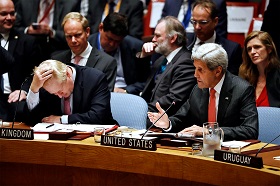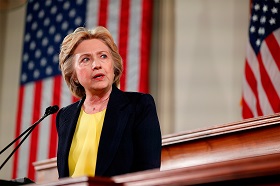If Hillary Clinton is the schoolmarm, Donald Trump is the troublemaker in the back of the class. People are afraid of him and he is frequently called to the front to be disciplined, but for all this many admire him secretly and even want to emulate him. Who is more likely to win on November 8 and what should Russia do during the pause between election day and inauguration day in the US?
Cooperation on Syria has been suspended. What went wrong?
From the very start, the US Administration was divided over the Syria ceasefire deal between Russian Foreign Minister Sergey Lavrov and US Secretary of State John Kerry. The US Department of State and the Pentagon took different positions on it. The US military did not want to work with their Russian partners whom they did not trust. They were skeptical of Moscow’s ultimate goals in the Syrian conflict. There were divisions before as well but they have become more pronounced now that the Obama Administration is approaching the end of its term. This is eventually what prevented the sides from taking full advantage of the opportunities opened up by the agreement.
In addition, it is unfortunate that the United States failed to fully separate the moderate “patriotic” opposition from the radicals or terrorists. Incidentally, many experts believe that this is altogether impossible. There are grounds to agree with Russian diplomats who said the ceasefire agreement was unilateral to a certain extent. Russia managed to convince Bashar al-Assad, Iran and Hezbollah to suspend hostilities whereas the United States failed to fully keep its commitments under the agreement with respect to the opponents of Damascus. To be fair, there are several thousand armed groups – from ideological enemies to common criminals – currently fighting against Bashar al-Assad in Syria and it is hardly realistic to expect even major field commanders to quickly agree on a truce.
The disruption of Russian-US cooperation does not mean that in choosing between Moscow and ISIS the US is siding with the terrorists. However, the refusal to cooperate with Russia is indicative: the US does not consider the ISIS threat dangerous enough to establish genuine partnership with Russia to counter it. There is no shortage of American movies about alien invasions that galvanize all people on Earth – Americans, Russians and Chinese, to name a few – to forget their grievances and unite against a common enemy.
The failure of the Syria agreement shows that for the time being the US leadership does not consider ISIS a threat comparable to the alien invasions that spur collective action in Hollywood.
Naturally, the Americans took it very badly when eventually the Syrian army dropped out of the truce and unleashed a new offensive in Aleppo. Washington probably is deeply concerned over the consequences for the city’s civilians. However, refusing talks with Russia is unlikely to improve the situation in and around Aleppo, or in Syria as a whole. It is also obvious that the failure of the talks is a major personal defeat for John Kerry who spent so much time and energy on reaching this agreement. On a personal level, he deserves sympathy.
Syria negotiations after the November 8 elections
Russian-US bilateral consultations on Syria are unlikely to be resumed in the near future. Time has run out. A great deal depends on the outcome of the presidential elections in the US. The positions of Donald Trump and Hillary Clinton on Syria and the Middle East in general are far apart, at least judging by their rhetoric.
That said, I will venture to predict that America’s role in the Middle East as a whole is more likely to decrease than increase. The Americans are tired of this region, failed interventions, unreliable partners and dubious friends. Furthermore, the US will soon become energy self-sufficient and, given this reality, the Middle East is losing its status of a foreign policy priority. However, there is still the US-Israeli alliance, détente with Tehran and other factors that link the US to the region.
Meanwhile, Russian-US dialogue is not the only format for Syrian negotiations. Suffice it to mention the UN Security Council, multilateral Geneva peace talks on Syria, and the tireless UN Special Envoy for Syria Staffan de Mistura. Incidentally, his group includes one of Russia’s best experts on the Middle East, Vitaly Naumkin, who is greatly respected in the region. Syrian talks will continue at a variety of venues and through some Russian-US channels.
During the transitional period in Washington after the election, Russia may place more emphasis on cooperation with regional players, such as Iran, Iraq, Turkey, probably Israel and even the Gulf countries. Obviously, no Russian-US agreement, even if preserved, would replace a deal with leading regional powers. It will be extremely difficult to find a common denominator but nothing will work without it.
Draft law on plutonium – Russia’s signal
The draft law suspending a Russian-US deal on the disposal of weapon-grade plutonium is a very strong and unequivocal political signal, aimed less at the current administration than its potential successors. After all, the same decision could have been formalized differently – “on the operational level” so to speak, all the more so since the hopes for carrying out this 15 year-old agreement were long gone and neither side has even started the process. However, Russia decided to make a tough stand and explained its decision to suspend the agreement by citing several major political grievances with Washington.
Russia’s arguments to justify its decision to walk away from the agreement on weapon-grade plutonium can be divided into two parts. The first is strictly technical. Moscow is displeased with Washington’s mechanism for disposing of this plutonium. There are doubts about the irreversibility of this process and suspicion that, if need be, the US could reverse course and use the plutonium to produce nuclear warheads.
I do not consider this argument terribly convincing: today US and Russian capabilities are limited by the number of nuclear delivery vehicles rather than the accumulated reserves of weapon-grade plutonium. Even if the Pentagon decided to fiddle with the disposal of plutonium, the US would not gain a decisive nuclear advantage of any kind. That said, it is up to experts to deal with technical issues.
The political part is much less ambiguous. First, since Soviet times Moscow had been against making its cooperation with Washington on strategic issues dependent on any other aspects of bilateral relations. By and large this principle worked. But Moscow has now departed from its traditional position: to resume nuclear cooperation, the US has to fulfill a long list of political demands that have nothing to do with the agreement.
Moreover, the nature of these demands (to rescind the Magnitsky list and anti-Russian sanctions, pay compensation for US sanctions and Russia’s counter-sanctions, and dismantle US military infrastructure on NATO’s eastern flank) makes it absolutely impossible for Washington to accept them. Some would require the consent of Congress, while others would have to be endorsed by NATO and so on.
To sum up, even if the White House decided to accept this complete and unconditional surrender to the Kremlin and pay reparations to the winner, it would still be impossible to carry out this decision in practical terms.
Message to the new US president
While reading the list of Russia’s demands to the US, I was reminded of Ilya Repin’s famous painting “Reply of the Zaporozhian Cossacks to Sultan Mehmed IV of the Ottoman Empire.” Needless to say, the Kremlin is not Zaporozhian Sech. The tough ultimatum to the US should not be viewed as an emotional response to the failure of the Syrian agreement or some other US irritants.
By putting the US on notice, Russia was in fact acknowledging that it no longer hopes for any improvements in bilateral relations. In other words, there is nothing good to expect until late January at the earliest, and even then we will have to see.
As noted above, the draft law on weapon-grade plutonium is probably addressed to Obama’s successor rather than him. The future president now has a list of Russia’s grievances that are supposed to be reviewed and probably discussed with Moscow in the future. So, if the Russian list is a kind of a “request form” that implies subsequent bargaining and a search for compromise, Russia’s tactics are understandable. However, the presentation of this “request form” as a public document – and a legislative act at that – is bound to make it difficult to amend in the future.
Beyond that, much depends on who enters the White House in January, on whether it will be open to dialogue with Moscow, and on foreign policy and domestic concerns of the future US president. However, in any case these are tough terms for resuming Russian-US dialogue and whoever is elected will find it difficult to comply with them.
Predictable leader and a man who can surprise
If Hillary Clinton can be compared to “the brain” of the US political system, Donald Trump is its “spinal cord.”
Hillary has some obvious pluses: enormous experience, extensive political connections, international stature and the support of big business. Of course, she will more or less follow Obama’s playbook with some variations and updates – more emphasis on human rights, tougher rhetoric on the Kremlin, and stronger resistance to Bashar al-Assad in Syria. For the time being, a new strategy seems unlikely and those who are completely disappointed in Obama will hardly turn into enthusiastic supporters of his preferred successor.
Russia will find it difficult to deal with Hillary but at least there will be no surprises. In general, we know approximately what to expect of her and what team she will bring to the White House. She is a foreign policy professional and understands well both US capabilities and limitations. She is fairly predictable. She is strict and may be combative, but ultimately she’s a predictable secondary school teacher.
Trump is not. He knows much less about foreign policy but feels more with his “spinal cord” at the level of intuition. He feels that another eight years of Obama’s policies will not solve America’s problems and that some unconventional and untraditional approaches are called for. He himself probably does not know what he will do exactly, but there is a demand for change in American society and Trump is trying to tap into it.
If Hillary Clinton is the schoolmarm, Donald Trump is the troublemaker in the back of the class. People are afraid of him and he is frequently called up to the blackboard to be disciplined, but for all this many admire him secretly and even want to emulate him.
I think Trump is most likely to surprise us. There will likely be good surprises and bad ones. While he represents a clean break from Obama and his legacy, he inevitably will present risks when making emotional, on-the-spot decisions that won’t be well thought out and could lead to serious mistakes.
Who wins?
Polls show that Clinton is still ahead of Trump in the number of electoral votes needed to win (not necessarily the number of voters). If the election were held tomorrow, she’d win by a wide margin. Obviously, Trump failed to knock her out during the first debates and her health problems are not serious enough to cause her to drop out.
But are some poll respondents concealing their intention to vote Trump?
For many in America, support for Trump is looked down on, or at least seen as politically incorrect. So we should mentally factor in these timid Trump’s supporters. Nobody knows how many of them are out there, but ultimately this is what the outcome of the election will turn on.
Let’s not forget that the overwhelming majority of US media and think tanks are emphatically opposed to Trump. So it would be wrong to trust their universal prediction that Clinton can’t lose.
Last but not least, there is still a month before the election and a lot could change. There could be new political scandals, unexpected leaks and international complications. Most of these uncertainty factors are playing against Clinton. The upcoming debates could also change the landscape.
Equation with many unknowns
As far as I can judge, Trump is viewed more positively in Russia than Clinton but I doubt we can be certain of who is better for Russia. This is an equation with many unknowns.
Regardless of the outcome, the election is bound to usher in a pause in our relations. The new administration will require time to assemble a team, make key appointments in the administration, itemize the legacy of predecessors and draft a foreign policy strategy. This usually takes about half a year and sometimes longer.
It makes sense to look at the appointments made during this period. Much will depend on it. Trump, for one, may appoint a seasoned diplomat as Secretary of State, with greater authority over foreign policy in the administration. This will balance off Trump’s own inexperience. In turn, Clinton could appoint to this position a person with moderate and balanced views, including on Russia, for instance, Bill Burns, former US ambassador to Russia (2005–2008), or it could be a hawk from her entourage. It would fall to these people to modulate the campaign rhetoric.
As things currently stand, it is much more important for Russia to determine its line and interests in relations with the United States, as well as how far we are willing to go to compromise.
The better we prepare for this new stage, the better the chance our relations will at least remain at a mutually acceptable level, if not improve.
During this period, it is very important to refrain from statements or steps that may be seen by the White House as anti-American and requiring immediate response. We should be mindful of the old joke: “My neighbors are totally crazy. Late at night they start pounding on the ceiling, walls and radiators. Lucky for me I’m not asleep at that hour; that’s when I play accordion.”







